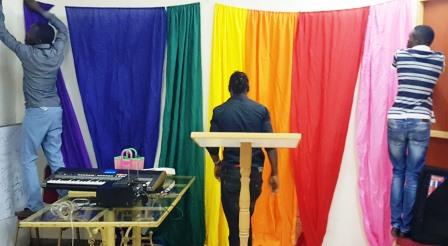Christianity and Queer World-making in Kenya

In this post, Adriaan van Klinken reflects on the politics of sexuality in Kenya, often misrepresented by Eurocentric accounts of Africa as 'Europe’s Other'. Van Klinken is Associate Professor of Religion and African Studies at the University of Leeds. Among many other publications, he is the author of Kenyan, Christian, Queer: Religion, LGBT Activism, and Arts of Resistance in Africa (Penn State University Press, 2019).
Queer world-making, then, hinges on the possibility to map a world where one is allowed to cast pictures of utopia and to include such pictures in any map of the social (Muñoz 2009, 40).
In recent years, African societies have become increasingly associated with social and political homophobia. A 2011 BBC documentary famously dubbed one African country as ‘the world’s worst place to be gay’. In the narrative of the documentary, this country, Uganda, becomes paradigmatic of the African continent as a whole. This, of course, creates a nice contrast to Europe, which is implicitly framed as liberal and progressive on LGBT (lesbian, gay, bisexual and transgender) issues. For long, Africa has been Europe’s Other, and it still is.
Homophobia and the politics against homosexuality and LGBT human rights in Africa are often explained with reference to the prevalence of religion on the continent. In contrast to a secularised and enlightened Europe, conservative religion must obviously be the root cause of Africa’s alleged backwardness.
The problem with these representations is that they tend to essentialise “African homophobia”, ignoring the colonial histories and political economies that have produced it, and tend to victimise African LGBT people, depriving them of agency. They also give a one-sided account of the role of religion in African politics of homosexuality, and in African public life more generally. As if religion can only support conservative socio-political agendas. Recognising that religious thought and practice is vital to political mobilisation, shapes personal agency, and is part of public culture in contemporary African societies means that we have to acknowledge the multiple and often complex ways in religion is part of African politics of sexuality.
Researching in this area for the past ten years, I have become increasingly interested in emerging forms of LGBT visibility and mobilisation in African societies. I noticed that many of the LGBT people I met across the continent identified with, and practiced, some form of faith. I also observed that religious belief and practice was creatively engaged by LGBT communities and appropriated as part of grassroots queer politics on the continent.
My recent book Kenyan, Christian, Queer: Religion, LGBT Activism, and Arts of Resistance in Africa, examines these dynamics with specific reference to Christianity in the context of Kenya. It presents four in-depth case studies of creative forms of LGBT activism – or “artivism”, as I call them – ranging from the literary writer Binyavanga Wainaina, the Same Love music video, the Stories of Our Lives project, and an LGBT affirming Nairobi based Christian church. Each of these case studies demonstrate how Christian texts, symbols, rituals and language provide a productive resource through which LGBT people in Kenya affirm their sexuality, claim public space, resist popular discourses, and present alternative imaginations. In other words, Christianity, as much as it fuels the homophobic rhetoric of political and religious leaders, is also part and parcel of Kenyan queer world-making.
For instance, Wainaina, in his critique of homophobic Pentecostal pastors, not only queerly appropriates their prophetic style but also invokes the image of the black Jesus that inspired Martin Luther King and James Baldwin in order to buttress his prophetic vision of a progressive and inclusive future for the African continent. The Same Love video blurs the genres of hip hop and gospel music and includes a quotation from the Bible, concluding with the statement that “Love is God and God is Love”. The queer Kenyans who tell their life story in Stories of Our Lives creatively blend biblical stories and Christian language in order to signify their own lives at the margins of society, while they narratively claim space for themselves. And in Cosmopolitan Affirming Church, queer folks engaged in charismatic worship and powerful preaching, reclaiming faith as an empowering space.
Achille Mbembe, in Critique of Black Reason, has stated that ‘struggle, as a praxis of liberation has always drawn part of its imaginary resources from Christianity’. Indeed, this applies to the history of liberation from slavery, colonialism and apartheid. In a similar way as black Africans have reclaimed Christianity from European missionaries, and African women have reclaimed Christianity from a patriarchal church, LGBT Africans currently add a new chapter to this history as they reclaim Christian faith from an institution deeply involved in homophobic and heteronormative politics.
The Bible and the Christian tradition provide them with narratives that help to imagine a queer utopia. Based on their belief that ‘Love is God and God is Love’, as stated in the lyrics of Same Love, and their hope for ‘a new heaven and a new earth’, as it was preached about in CAC, they engage in acts of resistance and social transformation. For a queer world to come, where loving relationships and embodied personhood in many different forms are recognised and celebrated.
